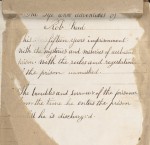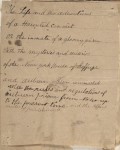 The earliest known prison memoir by an African American author will be available for sale next month. The original manuscript was discovered by a rare books dealer at an estate sale in Rochester, New York, a few years ago and acquired by Yale University’s Beinecke Rare Book & Manuscript Library in 2009. Yale English professor Caleb Smith, Beinecke curators and genealogical researcher Christine McKay were able to identify the author as Austin Reed, a free African American from Rochester who had spent much of life in penal institutions.
The earliest known prison memoir by an African American author will be available for sale next month. The original manuscript was discovered by a rare books dealer at an estate sale in Rochester, New York, a few years ago and acquired by Yale University’s Beinecke Rare Book & Manuscript Library in 2009. Yale English professor Caleb Smith, Beinecke curators and genealogical researcher Christine McKay were able to identify the author as Austin Reed, a free African American from Rochester who had spent much of life in penal institutions.
Reed was six years old when his father died. In the wake of the loss, he began to get into trouble, ditching school and going out at all hours. His exasperated mother decided that it was better for him to live in the country, far from the temptations and evils of the city, where, she hoped, he might be turned from his self-destructive path. She indentured him to the Ladd family to work on their farm in Avon, New York. Alas, like a latter-day Oedipus, Reed’s mother only doomed him to the fate she had so fervently wished to avert. When the farmer tied the boy up “like a slave” and beat him badly, Reed and two other child servants set fire to his home in revenge.
 Reed was convicted of arson in September of 1833 and was sentenced to serve 10 years at the New York House of Refuge, the first juvenile reformatory in the United States. He was 10 years old. The facility opened in 1825 in a former US arsenal in the Bowery. The freshman class consisted of six boys and three girls. A decade later when Reed was there it would house 1,600 children. It was dedicated to teaching its charges skills and professions with the laudable aim of rehabilitation, but the disciple was brutal and the workload extreme.
Reed was convicted of arson in September of 1833 and was sentenced to serve 10 years at the New York House of Refuge, the first juvenile reformatory in the United States. He was 10 years old. The facility opened in 1825 in a former US arsenal in the Bowery. The freshman class consisted of six boys and three girls. A decade later when Reed was there it would house 1,600 children. It was dedicated to teaching its charges skills and professions with the laudable aim of rehabilitation, but the disciple was brutal and the workload extreme.
From the beginning Austin Reed was rebellious and fought against prison authorities. His juvie records are replete with comments from the wardens describing him as “a deep knowing impudent brazen faced boy” and “a most notorious liar.” He made multiple attempts to escape, at least one of which was successful if only for a short time. Still, the troubled boy found some support there, especially from superintendents Samuel Wood, an abolitionist who saw to it that Reed learned how to read and write. His successor Mr. Terry took a different approach, inflicting harsh punishments and whipping Reed within an inch of life.
 He left the House of Refuge in 1839, only to quickly fall foul of the law again. Now an adult, he served the next 20 years in the notorious Auburn Prison, the oldest prison in the country still in use today. Auburn also had a stated aim of rehabilitation, but its methods were draconian: perpetual solitary confinement, violent whippings with cat-o-nine-tails, a form of waterboarding called the “shower bath,” being made to carry the “yoke,” a 40-pound bar of iron chained to the back of the prisoner’s neck and both hands.
He left the House of Refuge in 1839, only to quickly fall foul of the law again. Now an adult, he served the next 20 years in the notorious Auburn Prison, the oldest prison in the country still in use today. Auburn also had a stated aim of rehabilitation, but its methods were draconian: perpetual solitary confinement, violent whippings with cat-o-nine-tails, a form of waterboarding called the “shower bath,” being made to carry the “yoke,” a 40-pound bar of iron chained to the back of the prisoner’s neck and both hands.
 Reed was in his mid-30s when he completed the book in 1858. He always intended his memoir to be published and read by a wide audience. He wrote it with an audience mind, often addressing the reader. His titles make it clear that he saw sharing his story as a means to expose the many cruelties he’d encountered in his lifetime of dealings with the criminal justice system. His original title, in the prolix run-on format so popular in the 19th century, was: The life and adventures of Rob Reed, his fifteen years imprisonment with the mysteries
Reed was in his mid-30s when he completed the book in 1858. He always intended his memoir to be published and read by a wide audience. He wrote it with an audience mind, often addressing the reader. His titles make it clear that he saw sharing his story as a means to expose the many cruelties he’d encountered in his lifetime of dealings with the criminal justice system. His original title, in the prolix run-on format so popular in the 19th century, was: The life and adventures of Rob Reed, his fifteen years imprisonment with the mysteries  and miseries of Auburn Prison with the rules and regulations of the prison unmasked. The troubles and sorrows of the prisoner from the time he enters the prison untill he is discharged. In the notebook, that title is pasted over with a revised version: The Life and the adventures of a Haunted convict or the inmate of a gloomy prison with the mysteries and miseries of the New York House of Reffuge and Auburn Prison unmasked with the rules and regulations of Auburn Prison from 1840 up to the present time and the different modes of punishment.
and miseries of Auburn Prison with the rules and regulations of the prison unmasked. The troubles and sorrows of the prisoner from the time he enters the prison untill he is discharged. In the notebook, that title is pasted over with a revised version: The Life and the adventures of a Haunted convict or the inmate of a gloomy prison with the mysteries and miseries of the New York House of Reffuge and Auburn Prison unmasked with the rules and regulations of Auburn Prison from 1840 up to the present time and the different modes of punishment.
 Caleb Smith has whittled that revised title down to a more manageable The Life and the Adventures of a Haunted Convict and now, 150 years after Austin Reed first set out to tell the world about the hardships he endured, his plans have finally come to fruition. The Life and the Adventures of a Haunted Convict is published by Random House and can be pre-ordered at Amazon now for delivery on January 26th.
Caleb Smith has whittled that revised title down to a more manageable The Life and the Adventures of a Haunted Convict and now, 150 years after Austin Reed first set out to tell the world about the hardships he endured, his plans have finally come to fruition. The Life and the Adventures of a Haunted Convict is published by Random House and can be pre-ordered at Amazon now for delivery on January 26th.